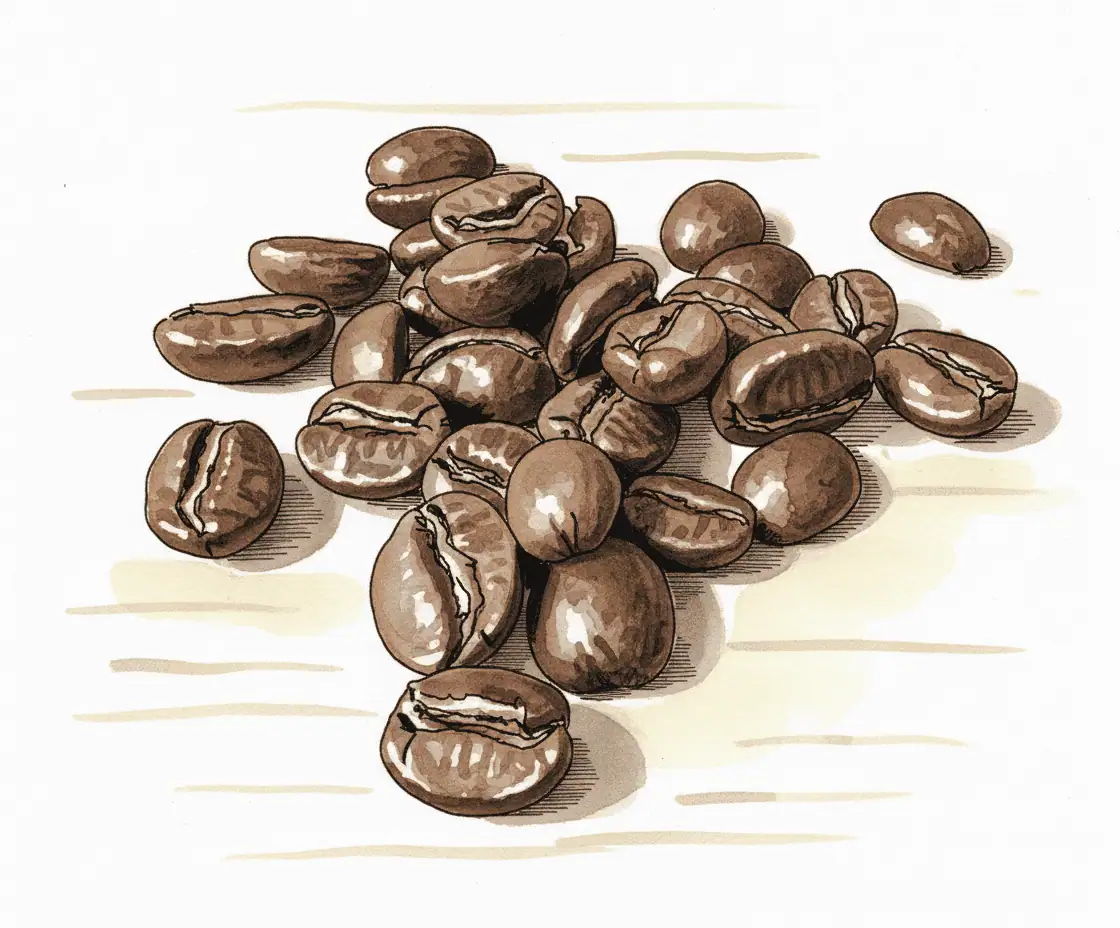Average altitude
Mid altitudes (around 1200–1500 meters) produce beans that offer a balance between sweetness and acidity. Growing conditions are still mild, yet the beans often develop more refinement than at lower elevations. This results in a brighter flavor profile, sometimes with subtle fruit or floral notes. Mid-altitude regions are common in countries such as Colombia, Mexico, and parts of Central America.
Beans

Brasil Santos
Brasil Santos komt uit Brazilië, vooral via de haven van Santos, en staat bekend om een milde en consistente smaak. De bonen groeien op lage tot middelhoge hoogtes in Minas Gerais en Sao Paulo. Het profiel is nootachtig, chocoladeachtig en licht honingachtig, met lage zuurgraad en een zachte body. Meestal gaat het om 100 procent…

Brasil Yellow Bourbon
Blooss Coffee Brasil Yellow Bourbon komt uit Minas Gerais, waar de variëteit sinds de jaren dertig wordt geteeld. Het brandprofiel varieert van medium tot donker en levert smaken van chocolade, noten, delicate bessen en honingzoet, met een volle, toegankelijke body en milde zuren. De bonen worden vaak natuurlijk of honey verwerkt, wat zorgt voor fruitige…

Brasil Yellow Bourbon
Brasil Yellow Bourbon van Coffee Goddess komt uit Minas Gerais en is natural verwerkt. Verwacht een zachte, romige body met tonen van melkchocolade, amandel en gedroogd fruit. Dit medium brandprofiel werkt uitstekend als filter en als espresso.Zo haal je het beste uit deze boon:Espresso 19 g in 38 g uit circa 29 s bij 93…

Brazil
Brazil Cascavel Verde is een 100 procent Arabica blend uit een Braziliaanse coöperatie op 800 tot 1100 meter. De koffie scoort SCA 84 en biedt klassieke tonen van amandel, donkere chocolade en karamel. Het gebrandprofiel leunt naar medium donker met milde bitterheid, een neutrale body en een frisse, zachte afdronk. Ideaal voor espresso en ook…

Brazil
Deze Brazil van The Coffee Lodge komt van Fazenda Recreio in Mogiana. Het is Yellow Bourbon, verwerkt als pulp natural. De medium branding versterkt de natuurlijke zoetheid en levert een romige body met een schone, lange afdronk.Smaak karamelsiroop noten melkchocolade.Structuur lage tot middelmatige aciditeit volle fluwele body.Geschikt voor espresso en filter en sterk in melkdranken.Herkomst…

Brazil - Carmo coffee
Brazil Carmo koffie komt uit Carmo de Minas, bekend om de hoge ligging, vruchtbare bodems en een mild klimaat. Veel partijen zijn natural of pulped natural en bestaan uit Mundo Novo en Yellow Bourbon. Medium roast brengt een volle body met toegankelijke smaken van melkchocolade, honing, noten en een zachte citruszuurgraad, soms met wijnachtige tonen.…

Brazil – Cascavel Vermelha
Cascavel Vermelha van Blommers brengt comfort en helderheid in de kop. De natural verwerking geeft een romig mondgevoel, met chocolade als basis en rijp fruit. Herkomst ligt in Minas Gerais en São Paulo, met zachte zuren en een volle body. Blommers brandt medium voor Daily Espresso en consistente prestaties, ook met melk.Smaak chocolade, nectarine, hazelnoot,…

Brazil – Daterra Masterpiece Martinez
Deze Stooker release komt uit Daterra in Cerrado Mineiro. Het is de Masterpiece Martinez met de Aramosa variëteit, bekend om lagere cafeïne. De kersen fermenteerden 60 uur anaerobic en droogden natuurlijk, wat zorgt voor rijp fruit en heldere zoetheid. Verwacht geel fruit, blauwe bes, oranjebloesem en honing, met milde specerijen en een schone, lange finish.…

Brazil – Daterra Stardust
Brazil Daterra Stardust van Stooker brengt rijp geel fruit en een fluweelzachte body. De kersen drogen aan de boom, wat zorgt voor diepte en zoetheid. De Cerrado-regio in Minas Gerais levert consistente rijping en klare smaken. Verwacht ananas, nectarine, perzik en een romige ondertoon in de kop. Deze moderne Brazil natural past bij liefhebbers van…

brazil – serra negra
Serra Negra is a single-origin Arabica from Minas Gerais in Brazil. White Label roasts it medium, with one profile for espresso and filter so the full chocolate tones and creamy notes are preserved. In the aroma there are dark chocolate, macadamia and pecan, with a subtle hint of citrus. The natural processing gives a sweet body and mild fruitiness…

Brazil – Campo Alegre
Deze release van Single Estate komt uit Sul de Minas en heet Brazil Campo Alegre. De natural verwerking geeft een volle body, milde zuurgraad en rijpe zoetheid. Verwacht cacao, warme noten en een schone, stroperige textuur. De espresso blijft helder in melk en staat ook op zichzelf sterk.Herkomst Sul de Minas Brazilië, variëteit Yellow CatucaíProces…

Brazil – Fazenda Santa Cruz
Fazenda Santa Cruz ligt in Caconde, Sao Paulo, waar sinds de jaren 1950 koffie wordt verbouwd. Op 960 hectare, met 180 hectare natuurreservaat, groeien arabicavariëteiten als Mundo Novo, Arara, Catuai, Catucai, Paraiso en Bourbon op 1000 tot 1200 meter. De bonen worden natural en pulped natural verwerkt, wat zorgt voor honingzoetheid, lage zuurtegraad en een…

Brazil – Serra Dos Ciganos
Maak kennis met Koffiestation Brazil Serra Dos Ciganos, een single origin uit Mogiana. De Serra dos Ciganos gemeenschap werkt met FAF aan kwaliteit en biodiversiteit. Natural verwerking levert een romige body en uitgesproken zoetheid. Verwacht melkchocolade, karamel, amandel en hazelnoot, met lage aciditeit en lange zoete afdronk. Dankzij zeiltransport naar Europa kies je bovendien bewuster.…

Brazil Alessandro Hervaz
Friedhats presenteert Brazil Alessandro Hervaz, een natural espresso uit Mantiqueira de Minas. Deze lot combineert melkchocolade en geroosterde hazelnoot met een romig, bijna karamelachtig mondgevoel. De variëteiten Mundo Novo en Red Catuai zorgen voor zoetheid en stabiliteit. De branding is gericht op body en een schone, lange afdronk die blijft hangen. Ideaal voor espressomachines en…
Mid-Altitudes (around 1200–1500 meters)
Looking for a beautiful balance between sweetness and acidity in the cup? Then beans from mid-altitude regions are a great choice. These areas are common in countries like Colombia, Mexico, and parts of Central America. Here you get the best of both worlds: enough coolness for a refined taste, yet enough warmth for good sugar development.
How altitude affects espresso flavor
At elevations of roughly 1200 to 1500 meters, coffee cherries still ripen more slowly than at sea level, but not as slowly as at very high altitudes. This creates a balanced espresso: a mildly sweet base, often with subtle fruity or floral hints, alongside a pleasant, not overly dominant acidity. These coffees are known for their approachable yet refined character. They are often ideal for those who enjoy an espresso with a clear flavor, but without the sometimes “sharp” edge of very high-grown beans.
Chemical composition: balance of sugars and acids
Mid altitudes still give the coffee plant enough coolness to build complexity, yet enough warmth to encourage sweeter notes. The beans generally have a slightly lower density than true high-grown beans, but remain firm enough to develop a wide flavor palette. You will notice the acids are a touch less pronounced, allowing the sweetness to come forward. This can yield a balanced cup of espresso with both freshness and a soft body.
Processing methods: diversity is key
In many regions at these elevations, there is active experimentation with different processing methods. The washed method remains popular, but honey and semi-washed processes are also often used, depending on local traditions and the desired flavor profiles. Thanks to slightly higher temperatures (compared to high mountains), sun-drying beans is often easier. This allows farmers to apply natural or pulped natural methods, which in turn leads to more sweetness and sometimes a hint of fermentation in the taste.
Climate and microclimate
At 1,200 to 1,500 meters, conditions usually mean mild temperatures, regular rainfall, and still plenty of sun. This kind of environment is ideal for coffee shrubs. They are protected from extreme heat, but also from the cold of great heights. As a result, the growing season is stable and fairly predictable. Microclimates arise from local variations in rainfall and hours of sunshine. A shrub on one mountainside can therefore produce slightly different flavor nuances than one on the slope next to it.
Yield and resilience
In general, the yield here is better than at very high elevations, because the plants are less stressed by colder nights or thin air. This means farmers can often produce slightly higher volumes while quality remains high. Moreover, the shrubs can often stay healthy for longer, provided they are well maintained. A stable yield is beneficial for the local community, as farmers’ income is less dependent on erratic harvests.
Choosing coffee varieties
In this altitude band, many Arabica varieties are found, such as Caturra, Colombia, and Bourbon. Farmers often choose plants that strike a good balance between yield and flavor. Some varieties are resistant to diseases like "coffee leaf rust", which is an important factor in areas with higher humidity. This allows farmers to grow with confidence, knowing they will harvest consistently tasty coffee.
Coffee from mid-altitudes is therefore highly recommended for anyone seeking a balanced espresso. Expect subtle fruit or floral notes, complemented by a mildly sweet body. No sharp extremes, but a rich, approachable flavor that many drinkers appreciate.
A selection for those who are open to a lively and complex coffee experience.
